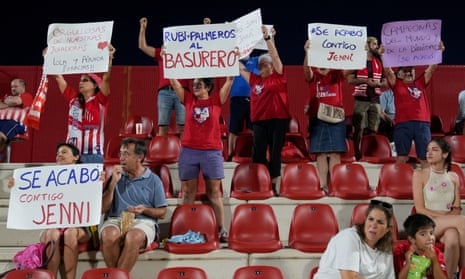“Se acabó” (in Spanish, “it’s over”). Those words were used by Alexia Putellas and other Fifa Women’s World Cup champions on social media just before all of them announced they would not return to play for the national team if the current leadership remained in place. By Sunday night, #SeAcabó was on the jerseys of Sevilla men’s football team and was a hashtag used by the UN, Spain’s government and athletes around the world to show support for the Spanish team. #SeAcabó was also used by women speaking up about abuse and bullying they have experienced.
Football players, politicians, singers and ordinary people showed solidarity with Jenni Hermoso, the star forward who received an unwanted kiss on the lips from her boss, the head of the Spanish football federation, Luis Rubiales, during the World Cup trophy ceremony. As Hermoso put it, it was “the straw that broke the camel’s back”.
The team said “se acabó” after a beleaguered Rubiales ranted against Hermoso, the “scourge” of “fake feminism”, the Spanish deputy prime minister, the equality minister, journalists and inclusive language. Rubiales also said that touching his genitals after the win against England was a gesture of support for the team’s male coach (it is actually not a normal gesture in Spain, and he apologised for doing it when standing next to the queen and her 16-year-old daughter). All this happened after he and his team pressured Hermoso and her family, gave a version of events that she described as “categorically false” and denounced on live radio as “dumbass” and “dickhead” anyone who criticised him. The reverberations continue. Today, the authorities announced a preliminary sex abuse investigation.
“Se acabó” was a long time coming, after years of private and public complaints. In 2022, 15 players refused to play for the team after they confronted the coach, Jorge Vilda, over his approach, amid allegations of bullying, but failed to remove him. Rubiales called the players “extortioners” and “brats”, and 12 of them were not selected for the World Cup. Years before, players had denounced the behaviour of the previous coach, Ignacio Quereda, who was forced to resign in 2015 after being in the job for 27 years amid complaints about denigrating behaviour.
Finally, this time was different. Male colleagues, coaches and sponsors supported the team. Chants asking Rubiales to resign were heard in stadiums around the country. Political leaders from left to right condemned Rubiales’ actions and asked for him to step down in an unusual display of consensus. Even the leader of the far right supported the calls for Rubiales’s resignation.
In Spain, we never saw with #MeToo what we are seeing now with #SeAcabó. Journalists uncovered abuses, as some women dared to speak out in strawberry-picking plants, universities, science labs and opera theatres, but the impact was not the same as it was in the US. People being abused were very reluctant to speak up, and media attention for those stories was often scarce.
Women’s Day marches attract millions every year (particularly in 2018). But we hadn’t seen such a universal reaction to a particular story.
In 2015, Vero Boquete, a star player at the time, gave an interview to El País after members of the women’s team wrote an open letter about Quereda, who was said to have pinched players’ bottoms and to have scolded them with remarks like “You need a macho man” or “You need a chilli up your ass”. The first question in that interview was: “Isn’t it cowardly to publish a letter now?”
Why is this time different? For three reasons. First, it involves a group of talented women who have been through professional trials and personal tragedy. In victory, they were finally powerful enough to speak up and be really heard.
Second, society has changed. In Spain’s case, this change has been accelerated by political leaders, both male and female. All-male panels still happen, corporations are dominated by men and news media leaders are rarely women. But our gender laws are among the most advanced in the west, and Spain fares better in the UN gender equality index than the US and the UK because of a higher percentage of women in parliament and a lower maternal mortality ratio and adolescent birthrate.
A third key element is good reporters. Many have published articles about Rubiales and his behaviour for years. One of the key moments of the week happened when Relevo – a small sports-focused news site for young people owned by Vocento, a conservative, mostly regional newspaper chain – published an article saying that Hermoso was being pressured to support Rubiales while the federation made up her words in a statement.
These facts and the outpouring of shock and indignation across the country pushed Spain’s acting prime minister, Pedro Sánchez, to act. Sánchez initially said Rubiales needed “to take more action”, while stressing that the football federation was not controlled by the government. Now the government is using all the levers it has to remove Rubiales, and Fifa has suspended him while it continues to investigate the case.
However this story ends, the team that won the World Cup has shown a courage that will continue to inspire women and men in Spain and beyond. The choice is stark, and people are making it. Who wouldn’t rather look like a victorious, acclaimed woman than a guy grabbing his crotch?
María Ramírez is a journalist and deputy managing editor of elDiario.es, a Spanish news outlet
Do you have an opinion on the issues raised in this article? If you would like to submit a response of up to 300 words by email to be considered for publication in our letters section, please click here.

